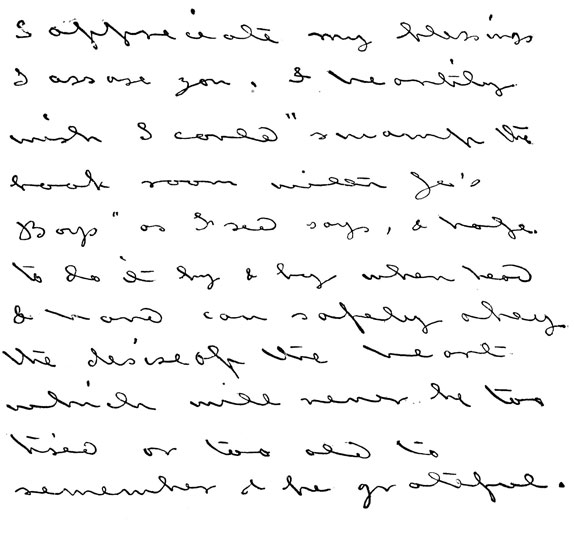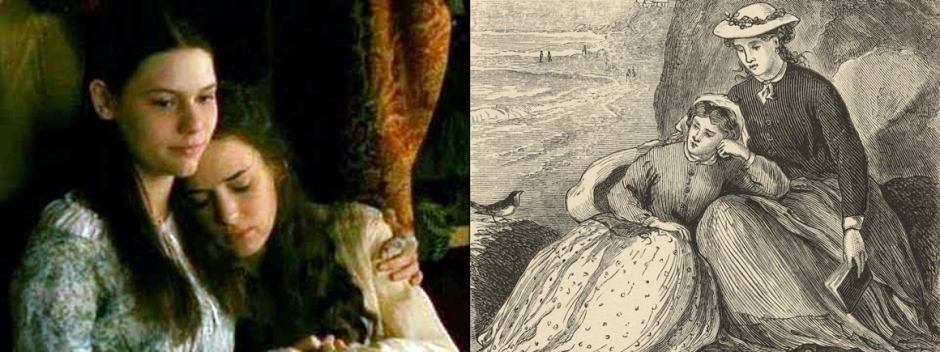At one time I considered writing Lizzie’s story as historical fiction. In that way I could go into her head and heart in a deeper way and speculate to my heart’s desire.
The problem is I have no idea how to write fiction. I never even read fiction. I have a feeling I would be a slave to the facts when the story in fact, is paramount.
But, I did try to write a couple of scenes. Here’s one I wrote several years ago. In reading this scene, it makes me want to try some more, just to get the words to flow.
The setting for this scene is Boston in 1852.
 A thick fog veiled the city in mist. It chilled Louisa as she walked down the street in long strides, swerving to avoid the endless stream of bodies at every turn. As she fingered the few pennies in her purse, a sigh escaped from her lips. A flicker of warmth permeated her body as she imagined the dear faces, but it soon dissipated. There was no victory today.
A thick fog veiled the city in mist. It chilled Louisa as she walked down the street in long strides, swerving to avoid the endless stream of bodies at every turn. As she fingered the few pennies in her purse, a sigh escaped from her lips. A flicker of warmth permeated her body as she imagined the dear faces, but it soon dissipated. There was no victory today.
Louisa meant to be a provider. Fueled by the need to support her “pathetic family,” she would ram her way through, using her brains, her words, her will to lift the yoke of poverty from the ones she loved. It was a heavy burden for the 20 year-old, concealed behind a mask of determination. The weight of that mask was nearly as heavy as the responsibilities she had taken on.
At last she spotted the familiar light in the window of the cramped basement apartment and Louisa made her way down the steps. She paused, taking a long breath, and planting a smile on her face, opened the door.
“Is that you Louy?” called Lizzie from the kitchen in a cheery voice. She stirred a large caldron of soup, her gentle face flushed and flanked by strands of wet hair. Pecking her younger sister on the cheek, Louisa set her face over the bubbling mixture, basking in the warm steam and savory scent.

“Yes, dearie, home safely and looking forward to your soup!”
She was secretly thankful that no one else had yet returned home. As a city missionary, her mother would often take in strangers even though the family was nearly as poor as they. Louisa admired her mother’s generosity but today she was glad the apartment was quiet and empty.
Louisa moved to a nearby chair and noticed her journal, opened to the last entry: “My quick tongue is always getting me into trouble, and my moodiness makes it hard to be cheerful when I think how poor we are, how much worry it is to live, and how many things I long to do I never can.”

Her father had written a message in the margin: “Anna’s journal is about other people while yours is about yourself.” Louisa lowered her head and sighed audibly; the mask became too heavy at that point and fell away.
Lizzie stopped with her preparations and gazed at her sister. Sensing the change, she walked over to the one comfortable chair in the room and sat down. Waiting patiently, she fixed her eyes on her sister. Louisa lifted her head and returned the gaze.
Lizzie’s face was as a deep pool, smooth as glass on a summer’s day. Louisa made her way over to the familiar place at her sister’s feet and laid her head in the warm lap. She sighed again as the chapped and delicate hands stroked her chestnut hair. A sweet voice whispered a favorite hymn into the ears that longed for the peace that was in such abundance in her younger sister.

Closing her eyes, Louisa drifted away momentarily to simpler days filled with open fields, bright sunshine and stirring breezes. Her yoke felt lighter in the healing presence of her sister’s love. No demands were made, no questions were asked.
* * * * * * * * * * * * *
As Lizzie tended to her sister she thought again of how much she loved Louisa’s luxuriant hair. So beautiful! Admiration welled up inside as she contemplated her sister’s battles. Such strength, such talent. So much courage to strike out on her own to help the family! Thinking back on her day tending the homestead, Lizzie too felt the weight of care, and the oppression of their poverty. Her view of the fog and mist was through the endless stream of muddy boots that passed by the basement window.
For love of her brave sister, Lizzie vowed to keep that serenity that was often fleeting, for the sake of her dear Louy.
* * * * * * * * * * * * *
Your thoughts?


You write very well for someone who doesn’t read fiction! You should consider it, but don’t stop blogging!
LikeLiked by 2 people
I think you have talent for creating an atmosphere 🙂
LikeLiked by 1 person
Thank you!
LikeLike
I’d love to read a whole book written this way. Thank you for sharing.
LikeLiked by 1 person
Wow, thank you!
LikeLike
Please keep writing Lizzie’s story! Your words brought me right into that room with my two favorite Little Women.
LikeLike
Thank you so much!
LikeLike
Hi, Susan! It’s Larissa from Brazil, if you still remember me! I love how you wrote this scene – as others commented, it sets a mood very well! I agree with your decision, though: I think because Lizzie is already a pretty obscure historical figure, a biography would be a more essential work. Besides, I’d be hard pressed to find an author who can explain how a conclusion was reached better than you do, so I think it’d be such a waste to not have you be the first Lizzie biographer to hit the bookstores! But I think if it’s something you’re interested in, you’d be a lovely novelist – you’ve got the talent and the habit of writing, so why not?
LikeLiked by 1 person
For now I will just write some more scenes to see if I can get into the flow of a novel (plus take a crash course on writing fiction — I have this book I’m working through). I need to do something to free up the writing — right now it’s just choked off by all the restrictions of writing biography.
LikeLike
Really good! I’d love to read more!
LikeLiked by 1 person
Thank you!
LikeLike
I have read “Little Woman in Blue” and “The Other Alcott.” Although I enjoyed both of them, I realized that the authors were playing fast and loose with the facts, and I longed for an actual biography of May. I feel the same way about Lizzie. Obviously, you should write what you want to write, but if I had a vote, it would be for a biography.
LikeLike
Goodness, finally just got around to reading this! (It’s testing season here.) – I liked this very much, and I think you may have both a biography and historical fiction in you! What about, after your adult biography, a fictionalized biography for a younger audience? Perhaps less daunting than a full novel, and you can put some of those fiction skills to good practice!
LikeLiked by 1 person
Thanks! Means a lot coming from you. Do you know of some sites that offer information about writing a fictionalized biography for young people?
LikeLike
p.s. I could see doing both of these simultaneously as the fictionalized biography could help with the writer’s block I am having over the biography. 🙂
LikeLike
Nice start, but how do yo say you don’t read functioning you read Alcott? Her work is only semi autobiographical. A great method is to start with a character and say “what if?” This is a nonprescription, but what happens? The answer to that is story.
LikeLiked by 1 person
I LOVED your thoughts here about Louisa & Lizzie!!
LikeLiked by 1 person
Thank you, means a lot!
LikeLike
Lovely picture of Claire Danes & Wynona Ryder from the 1994 movie!!
LikeLiked by 1 person
Re-read your vignette about “Louy” & “Lizzie” (actually I re-read it a lot!!). It makes me feel better each time I
read it. It kind of reminds me of a scenario from “Little Women” where Jo bemoans being born a girl as she “likes boys’ games” and wants to fight in the war to “help father”, and Beth consoled Jo and stroked “the rough head at her knee with a hand that all the dusting and dishwashing in the world could not make ungentle in its touch.”
You’re the greatest Susan!
Best Regards-Alex
LikeLike
Thank you! I need to write more of those vignettes to loosen up my writing. They are fun to do.
LikeLike
Keep up the good work Susan !!
It is so amazing to me how these girls, both the Alcotts and the fictional Marches who live so long ago can tug at our heartstrings, and I know I am very much influenced by them and their character.
For example,I have a much stronger appreciation for volunteers after reading about Beth in the “Burdens” chapter of
“Little Women”
Didn’t mean to ramble so much.
All my Very Best Regards Susan!!
LikeLike
Always happy to hear from you. 🙂
LikeLiked by 1 person
Thank you Susan. That means a lot to me!!
Best Regards
Alex
LikeLike
Is your book finished? I looked for it on Amazon, and could not find it. If you are still at work on the book, please, please bring it out soon! I so love how you capture Lizzie Alcott, This is the sister least known about, and I would love a book from her point of view! I am very excited about your project!
LikeLiked by 1 person
Thank you! I am in the middle of the first draft of the book which will be a biography. These things take time but be assured that I will complete it and keep everyone updated on its progress. I appreciate your enthusiasm about this project!
LikeLike
I too am chomping at the bit. Can’t Wait!! Best Regards Susan!!–Alex Laufer
LikeLiked by 1 person
Nice blog thanks for postting
LikeLiked by 1 person